Introduction
 Here, I offer you a brief insight into ancient Chinese wisdom, and show with the aid of some examples, how well it resonates with the results of modern medical research. If you take away a flavour of this short article and change just one thing in your life as a result, then your time reading it will have been well spent.
Here, I offer you a brief insight into ancient Chinese wisdom, and show with the aid of some examples, how well it resonates with the results of modern medical research. If you take away a flavour of this short article and change just one thing in your life as a result, then your time reading it will have been well spent.
The Chinese have long been interested in lengthening life and maintaining youth, and this has informed medical practice since ancient times. “Chang shou” or long life, is considered a blessing of heaven: it is a reward to be reaped for following the teachings of traditional Chinese medicine, about work, rest, diet, dress etc. (For some specific examples of these teachings, please read some of my Seasonal Tips.)

The idea of such preventative medicine appears in the classic texts of two millennia ago: “To wait for the battle before forging the weapons, to wait until one is thirsty before digging the well, is this not too late?” It is often said that people in those days, would therefore attend for acupuncture and advice at regular intervals during the year, most usually at the change of seasons, because that is when we are more vulnerable to imbalance.
Now we shall look at just two categories from a long list which the Chinese refer to as the causes of disease: these will be our emotional life, and our diet/eating habits. Bear in mind that moderation in all things, serves us well: to overemphasise exercise, at the expense of say diet, is not helpful.
Our Emotions & Their Health Implications
“When faced with something exasperating, one should calmly consider which is more important, anger or health.” (Cao Tong, Qing dynasty AD 1644-1912).
Emotions are considered in Chinese medicine, to harm us when we experience them too intensely or for too long: to be annoyed about a speeding ticket the day you have opened the envelope, would be understandable; to be completely enraged, or to still be angry six months later, would not! Indeed modern research shows a bout of intense anger increases the risk of a stroke within 2 hours, by a factor of 14 (Neurology Journal 2004), and increases by a factor of 17, the likelihood of a potentially fatal heart rhythm disturbance (Circulation Journal 2004). By comparison:
“Laughing makes you ten years younger.” (Chinese saying)
If things frequently wind you up, try to practise creating a space between the trigger, and your reaction. You then have a better chance of seeing that you’ve a choice between your old habitual reaction, and a new response which is less harmful to you.
For good health and a sense of well being, we need to promote a harmonious flow of Qi in the body. This is achieved by meditation, relaxation, exercise, happiness, and by cultivating a free flow of all our emotions, such that particular ones do not significantly linger or predominate.
“Flow with whatever is happening and let your mind be free. Stay centred by accepting whatever you are doing.” (Chuang Tzu c. BC369-286)
A lack of the more positive feelings, is seen as equally unhelpful: “People have illness because they do not have love in their life and are not cherished.” (Sun Simiao AD581-682) From the modern medical profession,”Those who feel lonely, depressed or isolated, are 3 to 5 times more likely to suffer premature death or disease. I don’t know of anything else across medicine that has such a broad and powerful impact.” (Dr Dean Ornish, Clinical Professor of Medicine at the University of California.) In the UK nowadays, depression is one of the top five conditions people seek acupuncture treatment for.
Diet & Recommendations on How to Eat
“Taking medicine but neglecting diet, wastes the skill of the physician.” (Chinese proverb)
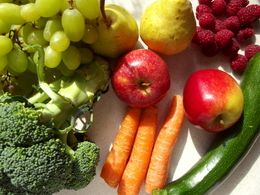 Diet is a cornerstone of good health. Chinese medicine can guide not only what we eat, but how we eat it. The ancient Yellow Emperor’s Classic of Internal Medicine, advised “The five cereals are staple food; the five fruits are auxiliary; the five meats are beneficial; the five vegetables should be taken in abundance.” 2500 years later, these priorities resonate strikingly with the UK’s “5-(portions of fruit & veg) a-Day” campaign. Over the centuries, subsequent texts reveal sophisticated developments in the use of food, including the transition to cooked food, made possible by drilling wood to create fire. Yi Yin in the Shang dynasty (BC1600-1046) emphasised that physicians should use the right kinds of food to help cure disease; food had now become equal to medicine.
Diet is a cornerstone of good health. Chinese medicine can guide not only what we eat, but how we eat it. The ancient Yellow Emperor’s Classic of Internal Medicine, advised “The five cereals are staple food; the five fruits are auxiliary; the five meats are beneficial; the five vegetables should be taken in abundance.” 2500 years later, these priorities resonate strikingly with the UK’s “5-(portions of fruit & veg) a-Day” campaign. Over the centuries, subsequent texts reveal sophisticated developments in the use of food, including the transition to cooked food, made possible by drilling wood to create fire. Yi Yin in the Shang dynasty (BC1600-1046) emphasised that physicians should use the right kinds of food to help cure disease; food had now become equal to medicine.
In essence, we should supplement the mild, bland foods such as rice, vegetables and potatoes, with smaller amounts of nourishing, richer foods, such as fish, meat and dairy. To this can be added modest quantities of stronger flavours from spices or sugar. The balance between all these constituents is not rigid, but depends on our daily activity eg manual labour or lots of sport, versus a desk job. It also needs to accommodate our stage in life eg the growing teenage years, or pregnancy. It should even pay heed to the climate in which we live or work.
Foods today are chosen to support the patient’s Qi, balance yin and yang, and to treat illness. So when recommending particular foods to a patient, an acupuncturist will take account of a host of factors, including the person’s complaint, age, constitution, living and working environment etc. You do not have to be unwell to benefit from advice on the most appropriate diet for you; we should all choose foods which help maintain our health.
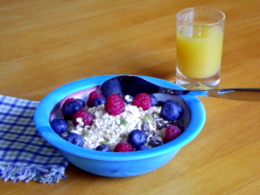 Finally, there is how we eat. Never skip breakfast. “People who eat breakfast are significantly less likely to be obese and suffer from diabetes than those who usually do not.” (American Heart Association’s 43rd Annual Conference on Cardiovascular Disease & Prevention).
Finally, there is how we eat. Never skip breakfast. “People who eat breakfast are significantly less likely to be obese and suffer from diabetes than those who usually do not.” (American Heart Association’s 43rd Annual Conference on Cardiovascular Disease & Prevention).
Try to take in most of your food up to and including lunchtime. Eat sitting, and relaxed, and not when stressed or angry.
Think about the food you are tasting, rather than devouring an entire plateful absentmindedly. Eat slowly and chew your food well.
“The stomach has no teeth” (Chinese saying)
Eat only to 7/10 full. After the meal, rub your abdomen with a circular motion, 25 times clockwise then 25 times anti-clockwise. Finally, after a short rest at the table, take a stroll. The Chinese say,”Walk a hundred paces after a meal, and one can live ninety-nine years.”
Below, you will find some modern medical research from which you might wish to take a few healthy living tips.

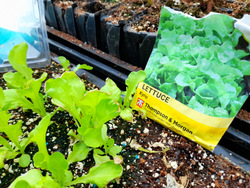
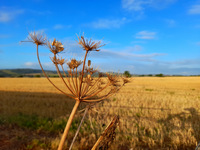
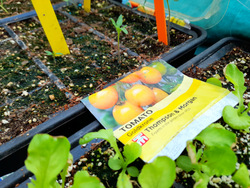
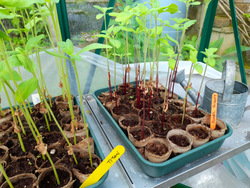
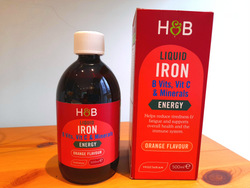 If an iron supplement has been recommended to you by a professional, then here are some useful guidelines for taking it. If you are unaware of these considerations, you won’t get the best value for money from your supplement and it may take longer than necessary for your iron levels to get back up to normal.
If an iron supplement has been recommended to you by a professional, then here are some useful guidelines for taking it. If you are unaware of these considerations, you won’t get the best value for money from your supplement and it may take longer than necessary for your iron levels to get back up to normal.  Haem iron is found in meat, fish and poultry. It is the most easily absorbed form of dietary iron.
Haem iron is found in meat, fish and poultry. It is the most easily absorbed form of dietary iron.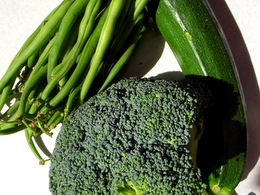 Non-haem iron is found in plant foods but also occurs in animal tissue. It is significantly less well absorbed than haem iron [1], so vegetarians and vegans have to be more vigilant when it comes to ensuring sufficient iron in their diets. Nevertheless, these foods are important components of a well-balanced diet.
Non-haem iron is found in plant foods but also occurs in animal tissue. It is significantly less well absorbed than haem iron [1], so vegetarians and vegans have to be more vigilant when it comes to ensuring sufficient iron in their diets. Nevertheless, these foods are important components of a well-balanced diet.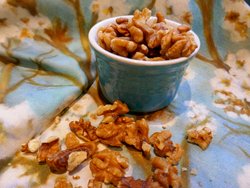 Some components in our diets can inhibit iron uptake. These are phytates, polyphenols, calcium and animal protein from milk and eggs. Taking these in order, phytates are present in plant-based diets in foods such as whole wheat, oats, rice, black beans, pinto beans, kidney beans, soybeans, peanuts, lentils, walnuts, pine nuts, almonds, sesame seeds, potatoes, beetroot, turnips and carrots. Once again, these foods are important elements of a well-balanced diet.
Some components in our diets can inhibit iron uptake. These are phytates, polyphenols, calcium and animal protein from milk and eggs. Taking these in order, phytates are present in plant-based diets in foods such as whole wheat, oats, rice, black beans, pinto beans, kidney beans, soybeans, peanuts, lentils, walnuts, pine nuts, almonds, sesame seeds, potatoes, beetroot, turnips and carrots. Once again, these foods are important elements of a well-balanced diet.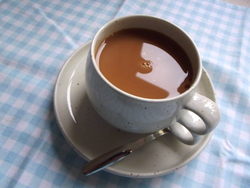 Next on the list of inhibitors come polyphenols. These are found in some fruit, vegetables, red wine and teas including herbal teas. They offer many benefits including anti-inflammatory and anti-oxidant properties and positively should be part of your diet. They do however, inhibit iron absorption. This means don’t have black tea, coffee, cocoa, or herb teas like chamomile or peppermint (the common ones I found referenced in the research literature) at the same time as your iron supplement. Black tea appears the most inhibiting and red wine the least. The addition of milk to tea and coffee appears to make no significant difference.
Next on the list of inhibitors come polyphenols. These are found in some fruit, vegetables, red wine and teas including herbal teas. They offer many benefits including anti-inflammatory and anti-oxidant properties and positively should be part of your diet. They do however, inhibit iron absorption. This means don’t have black tea, coffee, cocoa, or herb teas like chamomile or peppermint (the common ones I found referenced in the research literature) at the same time as your iron supplement. Black tea appears the most inhibiting and red wine the least. The addition of milk to tea and coffee appears to make no significant difference.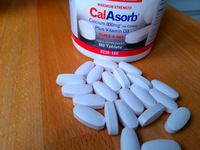 Another common inhibitor is calcium. This seems to have a limited effect on haem and non-haem iron absorption, being taken up preferentially at the expense of the iron. In the diet as a whole, it is probably less of an issue, but it would seem sensible if you have also been recommended to take a calcium supplement for osteoporosis say, not to take it at the same time as your supplemental iron.
Another common inhibitor is calcium. This seems to have a limited effect on haem and non-haem iron absorption, being taken up preferentially at the expense of the iron. In the diet as a whole, it is probably less of an issue, but it would seem sensible if you have also been recommended to take a calcium supplement for osteoporosis say, not to take it at the same time as your supplemental iron.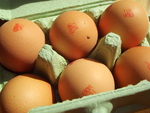 Finally, animal proteins such as milk and egg proteins, are also inhibitors of iron uptake, as is soy protein. It would follow that avoiding milk, eggs or sports protein supplements with your iron, would make sense.
Finally, animal proteins such as milk and egg proteins, are also inhibitors of iron uptake, as is soy protein. It would follow that avoiding milk, eggs or sports protein supplements with your iron, would make sense.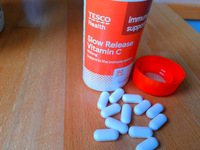 Next we come to the two main enhancers of iron uptake: vitamin C and animal tissue. Vitamin C is able to reduce Fe3+ to Fe2+ (see [1] below). Let vitamin C be a trump card for you. It can counteract the unhelpful effects of all the inhibitors mentioned above and is a good supplement to take alongside your iron.
Next we come to the two main enhancers of iron uptake: vitamin C and animal tissue. Vitamin C is able to reduce Fe3+ to Fe2+ (see [1] below). Let vitamin C be a trump card for you. It can counteract the unhelpful effects of all the inhibitors mentioned above and is a good supplement to take alongside your iron.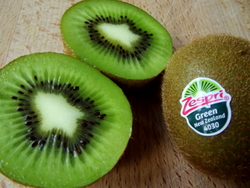 In vegetarian and vegan diets, fruit and vegetables rich in vitamin C can be used at every meal to enhance uptake of the non-haem iron in those meals. Kiwi fruit for example would be a good dessert. Connected with that though, be aware that cooking and storage can degrade vitamin C in food. This applies to freezing, and especially to the boiling of vegetables where vitamins C and B dissolve in the water which gets discarded.
In vegetarian and vegan diets, fruit and vegetables rich in vitamin C can be used at every meal to enhance uptake of the non-haem iron in those meals. Kiwi fruit for example would be a good dessert. Connected with that though, be aware that cooking and storage can degrade vitamin C in food. This applies to freezing, and especially to the boiling of vegetables where vitamins C and B dissolve in the water which gets discarded.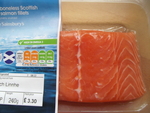 Distinct from the animal-derived proteins mentioned above as inhibitors, animal tissue on the other hand is an enhancer of iron uptake. This includes meat, fish and poultry.
Distinct from the animal-derived proteins mentioned above as inhibitors, animal tissue on the other hand is an enhancer of iron uptake. This includes meat, fish and poultry.